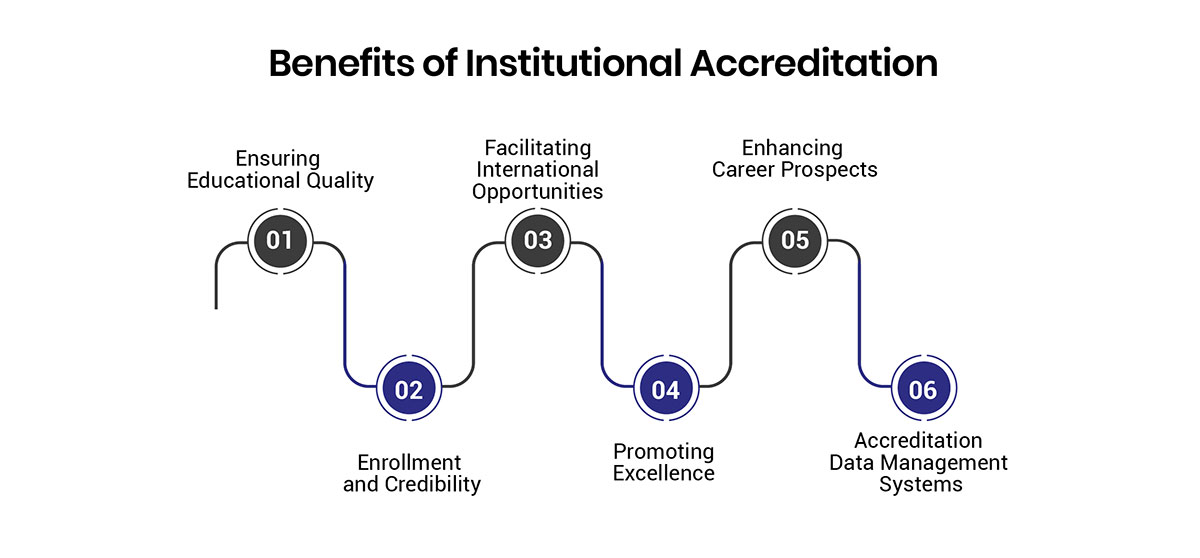In the journey of higher education, accreditation stands as a crucial guarantee of quality and conformity to established standards. Some of the benefits of accreditation include enhanced reputation, increased funding, and improved program quality. By accrediting, institutions demonstrate their commitment to excellence, safeguarding the interests of all stakeholders. Accreditation is not just a badge but a testament to an institution's dedication to nurturing future leaders.
What is Accreditation?
Accreditation stands as a cornerstone in the realm of higher education, ensuring institutions meet rigorous standards. It encompasses a thorough evaluation process, including data management, curriculum design, assessments, and facilities provision.
By adhering to accreditation guidelines, institutions uphold the quality of education and strive for continuous improvement. Through accreditation, students are assured of receiving quality education, supported by qualified faculty and robust infrastructure. Employers and academic institutions recognize accredited colleges, enhancing students' career prospects.
Ultimately, accreditation inculcates accountability, maintaining the integrity and effectiveness of the educational system.
Importance of Accreditation
Institutional accreditation stands as a crucial milestone for educational institutions, signifying their commitment to excellence and adherence to rigorous standards.
The accreditation process involves several key steps, including peer review, site visits, and a final decision by accrediting bodies.
During the peer review stage, institutions meticulously compile and submit institutional data and compliance reports, showcasing their academic performance over recent years. These reports undergo thorough scrutiny, with any errors or deficiencies addressed to ensure accuracy and completeness.
Upon satisfactory completion of the peer review process, institutions proceed to the visit and examination stage, where accreditation committees conduct on-site assessments. These committees verify the information provided in the reports, ensuring that institutions meet the specified standards and criteria.
The final decision regarding accreditation is based on the findings of the site visits and examinations.
Accrediting bodies weigh various factors, including academic quality, institutional resources, and compliance with regulatory requirements, before rendering their verdict.
The accreditation process serves as a catalyst for institutional growth and improvement. By identifying areas for enhancement and addressing deficiencies, institutions can refine their academic structures and operations, ultimately bolstering their educational offerings and reputation.
Moreover, accreditation instills confidence and trust in stakeholders, including students, faculty, employers, and the broader community.
Accredited institutions are recognized for their commitment to quality education, fostering a culture of continuous improvement and accountability.
Accreditation is indispensable for higher education institutions seeking to uphold academic standards, foster excellence, and earn the trust and respect of stakeholders as well. It not only validates institutional quality but also serves as a driving force for ongoing enhancement and innovation in the educational landscape.
Benefits of Institutional Accreditation in Higher Education
Accreditation of institutions benefits not only its stakeholders, but also the society as it facilitates the delivery of quality education which brings up a productive youth.
So, let us delve into some of the major benefits of institutional accreditation in higher education.

-
Ensuring Educational Quality
In the realm of higher education, institutional accreditation stands as a hallmark of quality assurance, driving continuous improvement and excellence. Accreditation serves as a comprehensive process that evaluates institutions based on stringent standards and criteria. -
Enrollment and Credibility
Accreditation offers a multitude of benefits, each contributing to the enhancement of educational quality and institutional effectiveness. One of its primary advantages lies in ensuring that institutions meet established standards of education. By undergoing rigorous assessment, institutions demonstrate their commitment to maintaining high academic standards and providing students with a quality learning experience. This instills confidence in prospective students and parents, thereby improving enrollment rates and fostering a sense of trust and credibility. -
Facilitating International Opportunities
Moreover, accreditation plays a pivotal role in facilitating credit transfer and recognition of degrees internationally.Accredited institutions are recognized globally, allowing graduates to pursue further studies or career opportunities abroad with ease.
This global recognition enhances the value of degrees conferred by accredited institutions, empowering graduates to compete effectively in the global job market.
-
Promoting Excellence
Furthermore, accreditation promotes continuous improvement and accountability within institutions. Through regular self-assessment and external evaluations, institutions identify areas for enhancement and implement measures to address them.This commitment to ongoing improvement ensures that institutions remain responsive to evolving academic demands and student needs, thereby enhancing the overall quality of education.
-
Enhancing Career Prospects
Additionally, accreditation opens doors to research opportunities and networking for students and researchers. Accredited institutions often provide access to state-of-the-art research facilities, expert faculty, and collaborative projects, fostering innovation and scholarly advancement.Networking with peers and experts in accredited institutions expands horizons and nurtures a culture of academic excellence and collaboration.
-
Accreditation Data Management Systems
Incorporating accreditation into institutional practices is facilitated by accreditation data management systems, which streamline processes, ensure data accuracy, and enhance compliance with accreditation standards.These systems offer benefits such as data security, report generation, and system analysis, enabling institutions to navigate the accreditation process efficiently and effectively.
Finally, accreditation is instrumental in enhancing educational quality, fostering global recognition, promoting continuous improvement, empowering graduates, and facilitating research opportunities. By upholding rigorous standards and embracing accreditation, institutions elevate their educational offerings, enrich student experiences, and contribute to the advancement of society as a whole.
Conclusion
Institutional accreditation in higher education is not merely a procedural requirement but a testament to a commitment to excellence and continuous improvement.
By upholding rigorous standards and undergoing thorough evaluation processes, accredited institutions ensure the delivery of quality education and foster trust among stakeholders.
From enhancing enrollment and credibility to facilitating international opportunities and promoting excellence, accreditation plays a pivotal role in shaping the educational landscape.
Through accreditation, institutions demonstrate their dedication to providing students with a transformative learning experience that prepares them for success in an increasingly competitive global environment.
Latest
Trends blogs
- From Vision to Impact: Closing the Gender Gap in STEM Education
- Automation, Artificial Intelligence, and the Future of Human-Centered Education
- Mid-Career Education in a Changing Labor Market
- The Next Phase of STEM Education: The Role of Artificial Intelligence in Classroom Curricula
Focus blogs
- Embedding Social-Emotional Learning within Classroom Environments
- Higher Education Innovation: The Strategic Role of International Partnerships
- Research-Driven Education: Strengthening Strategies, Policies, and Classroom Practice
- Professional Certifications for Career Growth: What Students and Young Professionals Need to Know





